- Home
- Gaston Leroux
Collected Works of Gaston Leroux Page 60
Collected Works of Gaston Leroux Read online
Page 60
And then came further delirium uttered in Russian, which was all the more terrible to Rouletabille because he could not comprehend it.
Then, suddenly, Feodor became silent and thrust away Matrena Petrovna.
“It is that abominable narcotic,” he said with an immense sigh. “I’ll drink no more of it. I do not wish to drink it.”
With one hand he pointed to a large glass on the table beside him, still half full of a soporific mixture with which he moistened his lips each time he woke; with the other hand he wiped the perspiration from his face. Matrena Petrovna stayed trembling near him, suddenly overpowered by the idea that he might discover there was someone there behind the door, who had seen and heard the sleep of General Trebassof! Ah, if he learned that, everything was over. She might say her prayers; she should die.
But Rouletabille was careful to give no sign. He barely breathed. What a nightmare! He understood now the emotion of the general’s friends when Natacha had sung in her low, sweet voice, “Good-night. May your eyes have rest from tears and calm re-enter your heart oppressed.” The friends had certainly been made aware, by Matrena’s anxious talking, of the general’s insomnia, and they could not repress their tears as they listened to the poetic wish of charming Natacha. “All the same,” thought Rouletabille, “no one could imagine what I have just seen. They are not dead for everyone in the world, the youths of Moscow, and every night I know now a chamber where in the glow of the night-lamp they rise — they rise — they rise!” and the young man frankly, naively regretted to have intruded where he was; to have penetrated, however unintentionally, into an affair which, after all, concerned only the many dead and the one living. Why had he come to put himself between the dead and the living? It might be said to him: “The living has done his whole heroic duty,” but the dead, what else was it that they had done?
Ah, Rouletabille cursed his curiosity, for — he saw it now — it was the desire to approach the mystery revealed by Koupriane and to penetrate once more, through all the besetting dangers, an astounding and perhaps monstrous enigma, that had brought him to the threshold of the datcha des Iles, which had placed him in the trembling hands of Matrena Petrovna in promising her his help. He had shown pity, certainly, pity for the delirious distress of that heroic woman. But there had been more curiosity than pity in his motives. And now he must pay, because it was too late now to withdraw, to say casually, “I wash my hands of it.” He had sent away the police and he alone remained between the general and the vengeance of the dead! He might desert, perhaps! That one idea brought him to himself, roused all his spirit. Circumstances had brought him into a camp that he must defend at any cost, unless he was afraid!
The general slept now, or, at least, with eyelids closed simulated sleep, doubtless in order to reassure poor Matrena who, on her knees beside his pillow, had retained the hand of her terrible husband in her own. Shortly she rose and rejoined Rouletabille in her chamber. She took him then to a little guest-chamber where she urged him to get some sleep. He replied that it was she who needed rest. But, agitated still by what had just happened, she babbled:
“No, no! after such a scene I would have nightmares myself as well. Ah, it is dreadful! Appalling! Appalling! Dear little monsieur, it is the secret of the night. The poor man! Poor unhappy man! He cannot tear his thoughts away from it. It is his worst and unmerited punishment, this translation that Natacha has made of Boris’s abominable verses. He knows them by heart, they are in his brain and on his tongue all night long, in spite of narcotics, and he says over and over again all the time, ‘It is my daughter who has written that! — my daughter! — my daughter!’ It is enough to wring all the tears from one’s body — that an aide-de-camp of a general, who himself has killed the youth of Moscow, is allowed to write such verses and that Natacha should take it upon herself to translate them into lovely poetic French for her album. It is hard to account for what they do nowadays, to our misery.”
She ceased, for just then they heard the floor creak under a step downstairs. Rouletabille stopped Matrena short and drew his revolver. He wished to creep down alone, but he had not time. As the floor creaked a second time, Matrena’s anguished voice called down the staircase in Russian, “Who is there?” and immediately the calm voice of Natacha answered something in the same language. Then Matrena, trembling more and more, and very much excited keeping steadily to the same place as though she had been nailed to the step of the stairway, said in French, “Yes, all is well; your father is resting. Good-night, Natacha.” They heard Natacha’s step cross the drawing-room and the sitting-room. Then the door of her chamber closed. Matrena and Rouletabille descended, holding their breath. They reached the dining-room and Matrena played her dark-lantern on the sofa where the general always reclined. The sofa was in its usual place on the carpet. She pushed it back and raised the carpet, laying the floor bare. Then she got onto her knees and examined the floor minutely. She rose, wiping the perspiration from her brow, put the carpet hack in place, adjusted the sofa and dropped upon it with a great sigh.
“Well?” demanded Rouletabille.
“Nothing at all,” said she.
“Why did you call so openly?”
“Because there was no doubt that it could only be my step-daughter on the ground-floor at that hour.”
“And why this anxiety to examine the floor again?”
“I entreat you, my dear little child, do not see in my acts anything mysterious, anything hard to explain. That anxiety you speak of never leaves me. Whenever I have the chance I examine the flooring.”
“Madame,” demanded the young man, “what was your daughter doing in this room?”
“She came for a glass of mineral water; the bottle is still on the table.”
“Madame, it is necessary that you tell me precisely what Koupriane has only hinted to me, unless I am entirely mistaken. The first time that you thought to examine the floor, was it after you heard a noise on the ground-floor such as has just happened?”
“Yes. I will tell you all that is necessary. It was the night after the attempt with the bouquet, my dear little monsieur, my dear little domovoi; it seemed to me I heard a noise on the ground-floor. I hurried downstairs and saw nothing suspicious at first. Everything was shut tight. I opened the door of Natacha’s chamber softly. I wished to ask her if she had heard anything. But she was so fast asleep that I had not the heart to awaken her. I opened the door of the veranda, and all the police — all, you understand — slept soundly. I took another turn around the furniture, and, with my lantern in my hand, I was just going out of the dining-room when I noticed that the carpet on the floor was disarranged at one corner. I got down and my hand struck a great fold of carpet near the general’s sofa. You would have said that the sofa had been rolled carelessly, trying to replace it in the position it usually occupied. Prompted by a sinister presentiment, I pushed away the sofa and I lifted the carpet. At first glance I saw nothing, but when I examined things closer I saw that a strip of wood did not lie well with the others on the floor. With a knife I was able to lift that strip and I found that two nails which had fastened it to the beam below had been freshly pulled out. It was just so I could raise the end of the board a little without being able to slip my hand under. To lift it any more it would be necessary to pull at least half-a-dozen nails. What could it mean? Was I on the point of discovering some new terrible and mysterious plan? I let the board fall back into place. I spread the carpet back again carefully, put the sofa in its place, and in the morning sent for Koupriane.”
Rouletabille interrupted.
“You had not, madame, spoken to anyone of this discovery?”
“To no one.”
“Not even to your step-daughter?”
“No,” said the husky voice of Matrena, “not even to my step-daughter.”
“Why?” demanded Rouletabille.
“Because,” replied Matrena, after a moment’s hesitation, “there were already enough frightening things about the hous
e. I would not have spoken to my daughter any more than I would have said a word to the general. Why add to the disquiet they already suffered so much, in case nothing developed?”
“And what did Koupriane say?”
“We examined the floor together, secretly. Koupriane slipped his hand under more easily than I had done, and ascertained that under the board, that is to say between the beam and the ceiling of the kitchen, there was a hollow where any number of things might be placed. For the moment the board was still too little released for any maneuver to be possible. Koupriane, when he rose, said to me, ‘You have happened, madame, to interrupt the person in her operations. But we are prepared henceforth. We know what she does and she is unaware that we know. Act as though you had not noticed anything; do not speak of it to anyone whatever — and watch. Let the general continue to sit in his usual place and let no one suspect that we have discovered the beginnings of this attempt. It is the only way we can plan so that they will continue. All the same,’ he added, ‘I will give my agents orders to patrol the ground-floor anew during the night. I would be risking too much to let the person continue her work each night. She might continue it so well that she would be able to accomplish it — you understand me? But by day you arrange that the rooms on the ground-floor be free from time to time — not for long, but from time to time.’ I don’t know why, but what he said and the way he said it frightened me more than ever. However, I carried out his program. Then, three days later, about eight o’clock, when the night watch was not yet started, that is to say at the moment when the police were still all out in the garden or walking around the house, outside, and when I had left the the ground-floor perfectly free while I helped the general to bed, I felt drawn even against myself suddenly to the dining-room. I lifted the carpet and examined the floor. Three more nails had been drawn from the board, which lifted more easily now, and under it, I could see that the normal cavity had been made wider still!”
When she had said this, Matrena stopped, as if, overcome, she could not tell more.
“Well?” insisted Rouletabille.
“Well, I replaced things as I found them and made rapid inquiries of the police and their chief; no one had entered the ground-floor. You understand me? — no one at all. Neither had anyone come out from it.”
“How could anyone come out if no one had entered?”
“I wish to say,” said she with a sob, “that Natacha during this space of time had been in her chamber, in her chamber on the ground-floor.”
“You appear to be very disturbed, madame, at this recollection. Can you tell me further, and precisely, why you are agitated?”
“You understand me, surely,” she said, shaking her head.
“If I understand you correctly, I have to understand that from the previous time you examined the floor until the time that you noted three more nails drawn out, no other person could have entered the dining-room but you and your step-daughter Natacha.”
Matrena took Rouletabille’s hand as though she had reached an important decision.
“My little friend,” moaned she, “there are things I am not able to think about and which I can no longer entertain when Natacha embraces me. It is a mystery more frightful than all else. Koupriane tells me that he is sure, absolutely sure, of the agents he kept here; my sole consolation, do you see, my little friend can tell you frankly, now that you have sent away those men — my sole consolation since that day has been that Koupriane is less sure of his men than I am of Natacha.”
She broke down and sobbed.
When she was calmed, she looked for Rouletabille, and could not find him. Then she wiped her eyes, picked up her dark-lantern, and, furtively, crept to her post beside the general.
For that day these are the points in Rouletabille’s notebook:
“Topography: Villa surrounded by a large garden on three sides. The fourth side gives directly onto a wooded field that stretches to the river Neva. On this side the level of the ground is much lower, so low that the sole window opening in that wall (the window of Natacha’s sitting-room on the ground-floor) is as high from the ground as though it were on the next floor in any other part of the house. This window is closed by iron shutters, fastened inside by a bar of iron.
“Friends: Athanase Georgevitch, Ivan Petrovitch, Thaddeus the timber-merchant (peat boots), Michael and Boris (fine shoes). Matrena, sincere love, blundering heroism. Natacha unknown. Against Natacha: Never there during the attacks. At Moscow at the time of the bomb in the sleigh, no one knows where she was, and it is she who should have accompanied the general (detail furnished by Koupriane that Matrena generously kept back). The night of the bouquet is the only night Natacha has slept away from the house. Coincidence of the disappearance of the nails and the presence all alone on the ground-floor of Natacha, in case, of course, Matrena did not pull them out herself. For Natacha: Her eyes when she looks at her father.”
And this bizarre phrase:
“We mustn’t be rash. This evening I have not yet spoken to Matrena Petrovna about the little hat-pin. That little hat-pin is the greatest relief of my life.”
V. BY ROULETABILLE’S ORDER THE GENERAL PROMENADES
“GOOD MORNING, MY dear little familiar spirit. The general slept splendidly the latter part of the night. He did not touch his narcotic. I am sure it is that dreadful mixture that gives him such frightful dreams. And you, my dear little friend, you have not slept an instant. I know it. I felt you going everywhere about the house like a little mouse. Ah, it seems good, so good. I slept so peacefully, hearing the subdued movement of your little steps. Thanks for the sleep you have given me, little friend.”
Matrena talked on to Rouletabille, whom she had found the morning after the nightmare tranquilly smoking his pipe in the garden.
“Ah, ah, you smoke a pipe. Now you do certainly look exactly like a dear little domovoi-doukh. See how much you are alike. He smokes just like you. Nothing new, eh? You do not look very bright this morning. You are worn out. I have just arranged the little guest-chamber for you, the only one we have, just behind mine. Your bed is waiting for you. Is there anything you need? Tell me. Everything here is at your service.”
“I’m not in need of anything, madame,” said the young man smilingly, after this outpouring of words from the good, heroic dame.
“How can you say that, dear child? You will make yourself sick. I want you to understand that I wish you to rest. I want to be a mother to you, if you please, and you must obey me, my child. Have you had breakfast yet this morning? If you do not have breakfast promptly mornings, I will think you are annoyed. I am so annoyed that you have heard the secret of the night. I have been afraid that you would want to leave at once and for good, and that you would have mistaken ideas about the general. There is not a better man in the world than Feodor, and he must have a good, a very good conscience to dare, without fail, to perform such terrible duties as those at Moscow, when he is so good at heart. These things are easy enough for wicked people, but for good men, for good men who can reason it out, who know what they do and that they are condemned to death into the bargain, it is terrible, it is terrible! Why, I told him the moment things began to go wrong in Moscow, ‘You know what to expect, Feodor. Here is a dreadful time to get through — make out you are sick.’ I believed he was going to strike me, to kill me on the spot. ‘I! Betray the Emperor in such a moment! His Majesty, to whom I owe everything! What are you thinking of, Matrena Petrovna!’ And he did not speak to me after that for two days. It was only when he saw I was growing very ill that he pardoned me, but he had to be plagued with my jeremiads and the appealing looks of Natacha without end in his own home each time we heard any shooting in the street. Natacha attended the lectures of the Faculty, you know. And she knew many of them, and even some of those who were being killed on the barricades. Ah, life was not easy for him in his own home, the poor general! Besides, there was also Boris, whom I love as well, for that matter, as my own child, because I shall be very happy t
o see him married to Natacha — there was poor Boris who always came home from the attacks paler than a corpse and who could not keep from moaning with us.”
“And Michael?” questioned Rouletabille.
“Oh, Michael only came towards the last. He is a new orderly to the general. The government at St. Petersburg sent him, because of course they couldn’t help learning that Boris rather lacked zeal in repressing the students and did not encourage the general in being as severe as was necessary for the safety of the Empire. But Michael, he has a heart of stone; he knows nothing but the countersign and massacres fathers and mothers, crying, ‘Vive le Tsar!’ Truly, it seems his heart can only be touched by the sight of Natacha. And that again has caused a good deal of anxiety to Feodor and me. It has caught us in a useless complication that we would have liked to end by the prompt marriage of Natacha and Boris. But Natacha, to our great surprise, has not wished it to be so. No, she has not wished it, saying that there is always time to think of her wedding and that she is in no hurry to leave us. Meantime she entertains herself with this Michael as if she did not fear his passion, and neither has Michael the desperate air of a man who knows the definite engagement of Natacha and Boris. And my step-daughter is not a coquette. No, no. No one can say she is a coquette. At least, no one had been able to say it up to the time that Michael arrived. Can it be that she is a coquette? They are mysterious, these young girls, very mysterious, above all when they have that calm and tranquil look that Natacha always has; a face, monsieur, as you have noticed perhaps, whose beauty is rather passive whatever one says and does, excepting when the volleys in the streets kill her young comrades of the schools. Then I have seen her almost faint, which proves she has a great heart under her tranquil beauty. Poor Natacha! I have seen her excited as I over the life of her father. My little friend, I have seen her searching in the middle of the night, with me, for infernal machines under the furniture, and then she has expressed the opinion that it is nervous, childish, unworthy of us to act like that, like timid beasts under the sofas, and she has left me to search by myself. True, she never quits the general. She is more reassured, and is reassuring to him, at his side. It has an excellent moral effect on him, while I walk about and search like a beast. And she has become as fatalistic as he, and now she sings verses to the guzla, like Boris, or talks in corners with Michael, which makes the two enraged each with the other. They are curious, the young women of St. Petersburg and Moscow, very curious. We were not like that in our time, at Orel. We did not try to enrage people. We would have received a box on the ears if we had.”

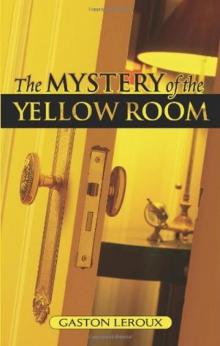 The Mystery of the Yellow Room
The Mystery of the Yellow Room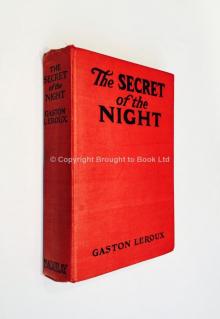 The Secret of the Night
The Secret of the Night In Letters of Fire
In Letters of Fire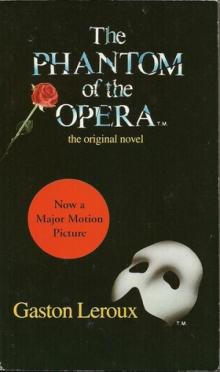 The Phantom of the Opera
The Phantom of the Opera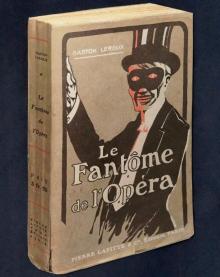 Fantôme de l'Opéra. English
Fantôme de l'Opéra. English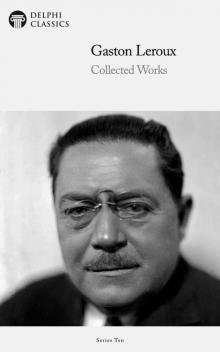 Collected Works of Gaston Leroux
Collected Works of Gaston Leroux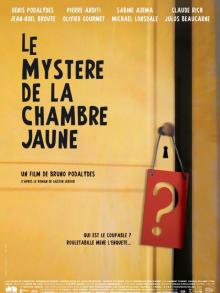 Le mystère de la chambre jaune. English
Le mystère de la chambre jaune. English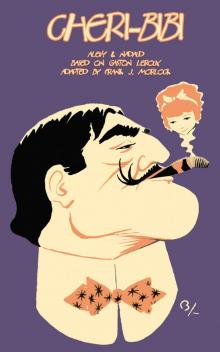 Cheri-Bibi: The Stage Play
Cheri-Bibi: The Stage Play The Phantom of the Opera (Oxford World's Classics)
The Phantom of the Opera (Oxford World's Classics)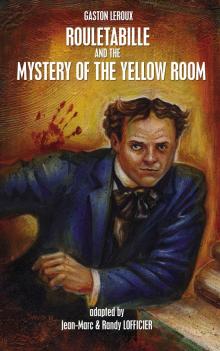 Rouletabille and the Mystery of the Yellow Room
Rouletabille and the Mystery of the Yellow Room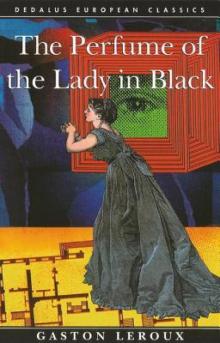 The Perfume of the Lady in Black
The Perfume of the Lady in Black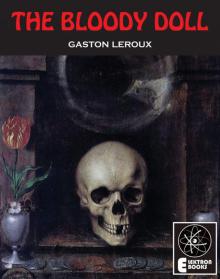 The Bloody Doll
The Bloody Doll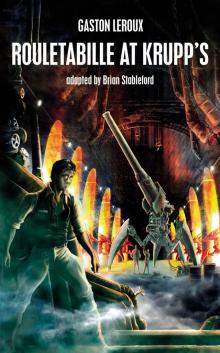 Rouletabille at Krupp's
Rouletabille at Krupp's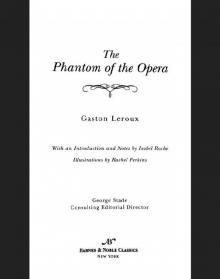 Phantom of the Opera (Barnes & Noble Classics Series)
Phantom of the Opera (Barnes & Noble Classics Series)